#Zenzo Matsuyama
Text
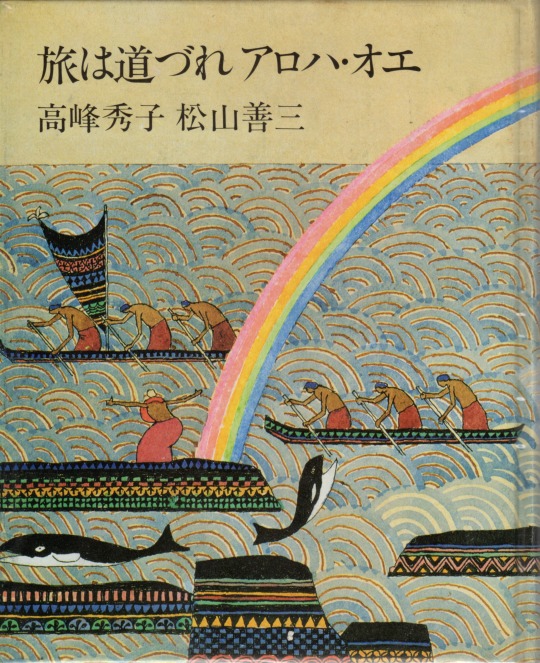
旅は道づれアロハ・オエ 高峰秀子・松山善三
潮出版社
装画・装丁=安野光雅
#旅は道づれアロハ・オエ#hideko takamine#高峰秀子#zenzo matsuyama#松山善三#mitsumasa anno#安野光雅#anamon#古本屋あなもん#あなもん#book cover
115 notes
·
View notes
Text

Zenzō Matsuyama - Happiness of Us Alone (1961)
18 notes
·
View notes
Text
THE HUMAN CONDITION 3: A SOLDIER’S PRAYER
From a lost soldier
To a prisoner of war
A good man broken
youtube
#the human condition#random richards#poem#haiku#poetry#haiku poem#poets on tumblr#haiku poetry#haiku form#poetic#A Soldier’s Prayer#tatsuya nakadai#michiyo aratama#Yusuke Kawazu#chishu ryu#masaki kobayashi#Zenzo Matsuyama#Koichi Inagaki#Junpei Gomikawa#criterion collection#criterion channel#Youtube
2 notes
·
View notes
Text

Noriko Maki and Chieko Baisho in Our Marriage (Masahiro Shinoda, 1961)
Cast: Noriko Maki, Chieko Baisho, Shin'ichiro Mikami, Isao Kimura, Eijiro Tono, Sadako Sawamura. Screenplay: Zenzo Matsuyama, Masahiro Shinoda. Cinematography: Masao Kosugi. Art direction: Chiyoo Umeda. Film editing: Yoshi Sugihara. Music: Naozumi Yamamoto.
It goes without saying (though I've said it often enough) that cultural differences are a hindrance to our understanding or enjoyment of films made in other countries, but Masahiro Shinoda's Our Marriage brought the point home for me in an unusual way. It's a simple, elegantly made film, scarcely over an hour long, about two sisters and the pressures on women to get married. That's nothing we haven't seen in films by Naruse and Ozu and others, but Shinoda is particularly focused on social and economic change -- not just in the role of women in Japan but also on a society in which upward mobility is becoming possible and desirable. Keiko (Noriko Maki) and Saeko (Chieko Baisho) are office workers in a factory, the daughters of a man struggling to make ends meet by harvesting seaweed. His job has become more difficult because of industrial pollution, and his wife sometimes has to borrow money from the daughters to pay bills. So the parents begin looking for a husband for 22-year-old Keiko. The father wants her to marry the son of the union chief at the factory, a widower nearing 30, but another man, Matsumoto (Isao Kimura), who works for a dry goods company, also shows interest in her. The parents disapprove of Matsumoto because he traded in the black market in the postwar years, but he has since cleaned up his act. The complication is that Keiko has met a handsome young factory worker, Komakura (Shin'ichiro Mikami). Saeko, who has a secret crush on Komakura, wants Keiko to marry him, and Keiko is certainly not averse to the idea except that Komakura doesn't make much money. Things work themselves out after some family drama, of course. But the cultural difference that mars the film for me is not the tension between arranged marriages and marrying for love -- that's familiar enough even in the Western tradition. The problem is that the music arranger has chosen the tune of the old spiritual "Michael, Row Your Boat Ashore" as the film's main theme. Anyone who grew up singing it around a campfire, or knows the recorded versions by Pete Seeger and Harry Belafonte, is going to have a hard time reconciling the music with the story.
1 note
·
View note
Photo
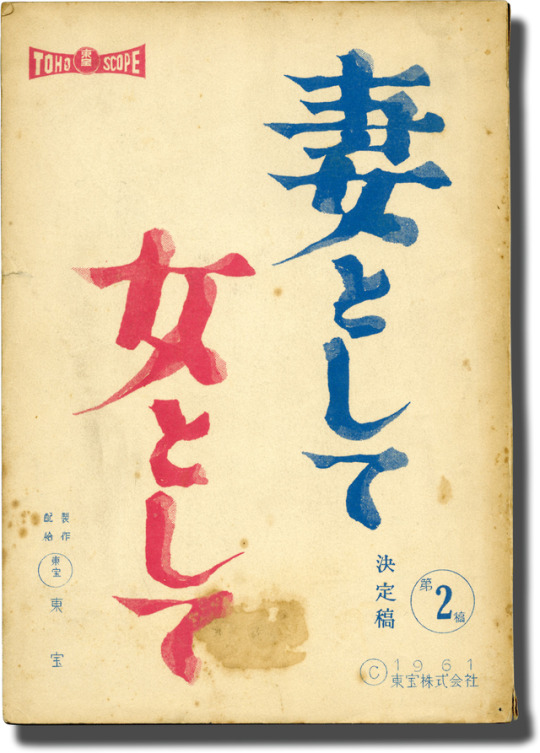
Toshiro Ide and Zenzo Matsuyama’s screenplay for Poignant Story (1961), directed by Mikio Naruse (August 20, 1905 – July 2, 1969).
8 notes
·
View notes
Photo
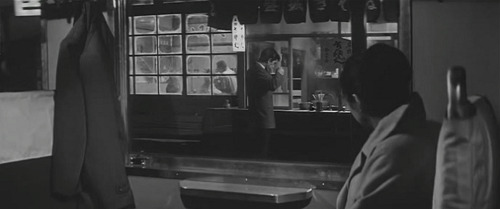
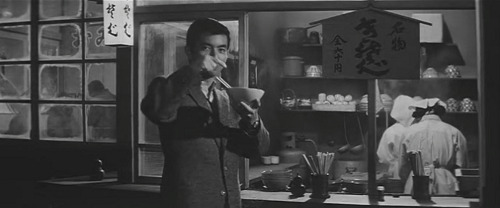

乱れる (1964) · Mikio Naruse
57 notes
·
View notes
Photo

Lobby card for Dark The Mountain Snow (六條ゆきやま紬), 1965, directed by Zenzo Matsuyama (松山善三) and starring Hideko Takamine (高峰秀子).
#Dark The Mountain Snow#六條ゆきやま紬#Zenzo Matsuyama#松山善三#Hideko Takamine#高峰秀子#lobby card#Toho#japanese movie#japanese film#japanese cinema#classic film#classic japanese film
49 notes
·
View notes
Photo
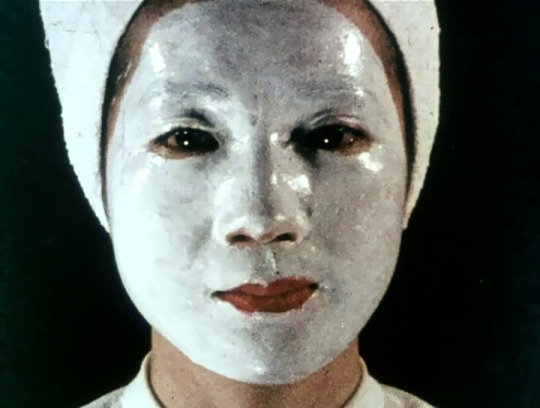


Tokyo 1958 (1958), Hiroshi Teshigahara, Zenzo Matsuyama, Susumu Hani Yoshiro Kawazu, Kyushiro Kusakabe, Sadamu Maruo, Kanzaburo Mushanokoji, Masahiro Ogi & Ryuichiro Sakisaka
#tokyo 1958#1958#tokyo#hiroshi teshigahara#zenzo matsuyama#susumu hani#yoshiro kawazu#kyushiro kusakabe#donald richie#sadamu maruo#kanzaburo mushanokoji#masahiro ogi#ryuichiro sakisaka
15 notes
·
View notes
Text
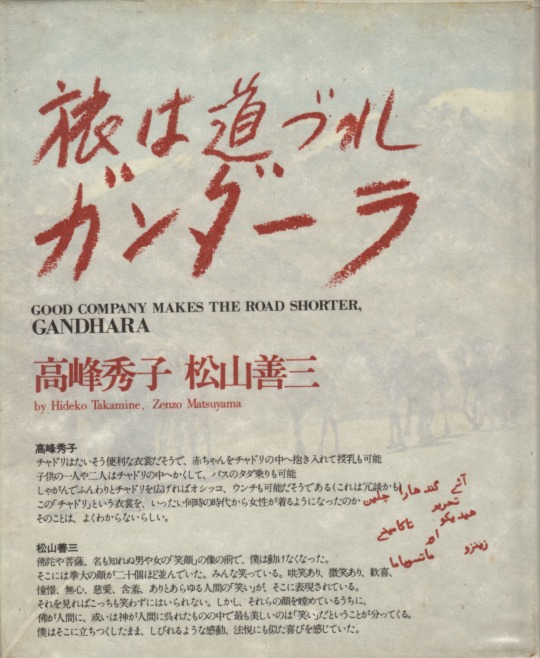
旅は道づれガンダーラ 高峰秀子・松山善三
潮出版社
題字=高峰秀子、写真=斎木幸子、装幀=亀海昌次
#旅は道づれガンダーラ#hideko takamine#高峰秀子#zenzo matsuyama#松山善三#sachiko saiki#斎木幸子#shoji kamegai#亀海昌次#anamon#古本屋あなもん#あなもん#book cover
20 notes
·
View notes
Text

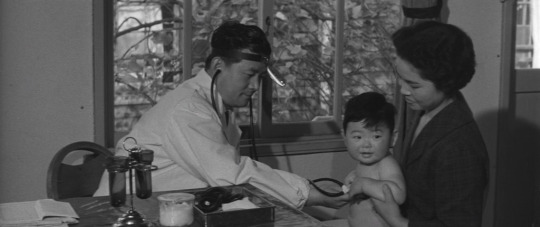


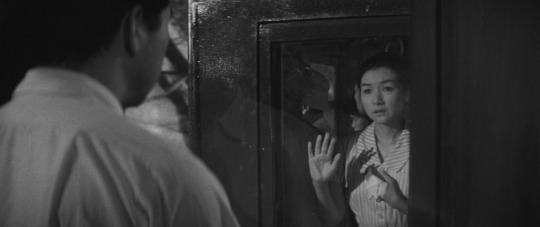
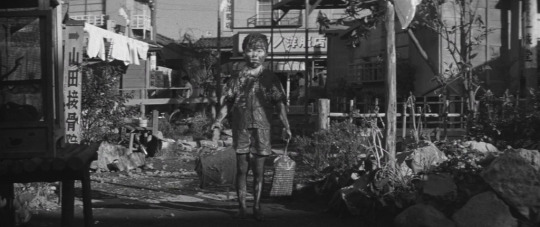

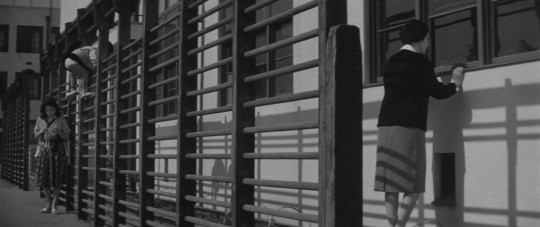


Zenzō Matsuyama - Happiness of Us Alone (1961)
11 notes
·
View notes
Text
THE HUMAN CONDITION 2: ROAD TO ETERNITY
Pacifist soldier
Morals detriment in war
Clash with his own men
youtube
#the human condition#road to eternity#random richards#poem#haiku#poetry#haiku poem#poets on tumblr#haiku poetry#haiku form#poetic#tatsuya nakadai#Michiyo aratama#criterion collection#masaki kobayashi#zenzo matsuyama#Jumpei Gomikawa#Junpei Gomikawa#Youtube
3 notes
·
View notes
Text
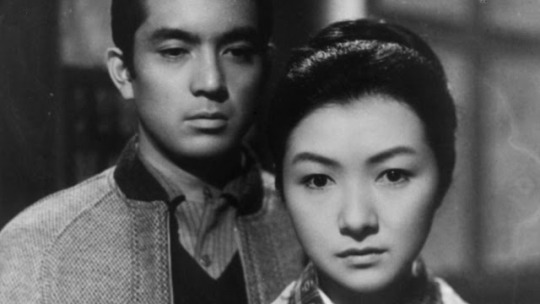
Yuzo Kayama and Hideko Takamine in Yearning (Mikio Naruse, 1964)
Cast: Hideko Takamine, Yuzo Kayama, Mitsuko Kusabue, Yumi Shirakawa, Mie Hama, Aiko Mimasu. Screenplay: Zenzo Matsuyama, based on a story by Mikio Naruse. Cinematography: Jun Yasumoto. Music: Ichiro Saito
Mikio Naruse's Yearning could almost have been a Douglas Sirk romantic melodrama, with Jane Wyman and Rock Hudson in the roles played by Hideko Takamine and Yuzo Kayama, except that Hollywood would never have allowed the Japanese film's bleak downer ending. (Sirk argued for an ending to the 1955 All That Heaven Allows in which Hudson's character died, but was overruled by producer Ross Hunter.) Like Sirk, Naruse takes the woman's side and uses the film for sharp commentary on the changing role of women. Reiko Morita's (Hideko Takamine) husband died in the war, after a brief marriage, but she stayed on to help the Morita family rebuild its business after the war ended, and in the subsequent years has run the family grocery and liquor store with great skill. But now a new threat has emerged to their business: the supermarket, which can afford to cut prices below what the Morita's store is able to charge. Reiko runs the store almost single-handedly, with no help from her brother-in-law, Koji (Yuzo Kayama), a college-educated layabout. And then her sister-in-law, Hisako (Mitsuko Kusabue), acting on a suggestion from her husband, proposes that the family convert the store into a supermarket because of its prime location. Koji, as the surviving male in the family, would become president -- if he can clean up his act. The problem with the plan is that there's no room in the scheme for Reiko, who is not actually a member of the family, even though she has kept it going for years. Meanwhile, Koji also discloses to Reiko that he's in love with her, which causes problems because she's his brother's widow as well as because she's 11 years older than he is -- the kinship and the age gap being huge challenges to tradition. When the situation reaches a crisis point, Reiko decides to go home to her own family, which lives far away. Koji follows her onto the train and in a long ride they try to work things out. Naruse and his lead actors give this concluding section a great poignancy, though it ends abruptly and painfully, leaving the audience to work out the consequences of the ending for themselves.
0 notes
Photo
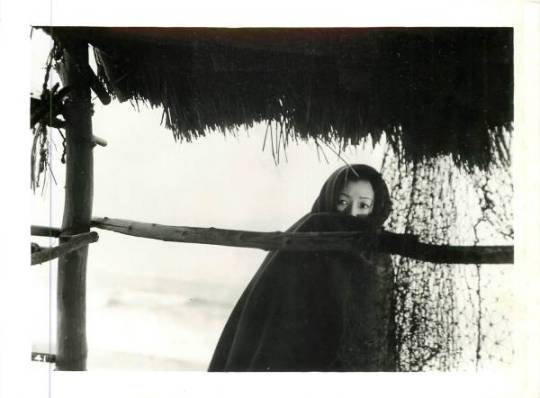
Press photo for Dark The Mountain Snow (六條ゆきやま紬), 1965, directed by Zenzo Matsuyama (松山善三) and starring Hideko Takamine (高峰秀子).
#Dark The Mountain Snow#六條ゆきやま紬#Zenzo Matsuyama#松山善三#Hideko Takamine#高峰秀子#Press Photo#Toho#japanese movie#japanese film#japanese cinema#classic film#classic japanese film
160 notes
·
View notes
Photo
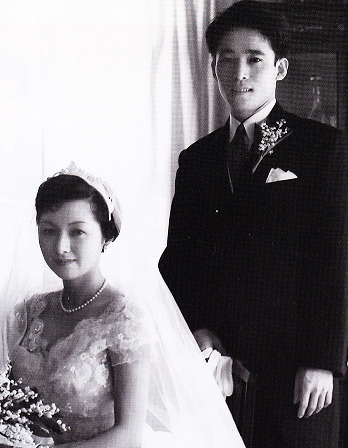

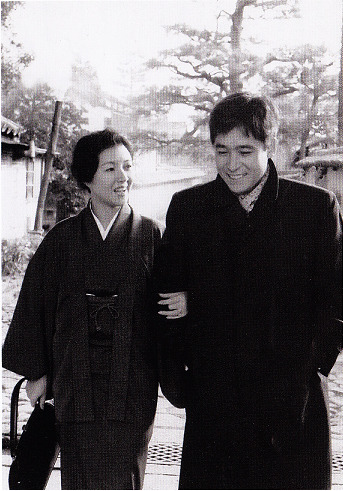

Hideko Takamine with husband Zenzo Matsuyama
32 notes
·
View notes